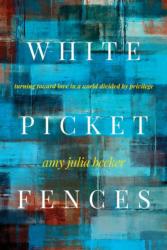 “White Picket Fences: Turning Toward Love in a World Divided by Privilege”
“White Picket Fences: Turning Toward Love in a World Divided by Privilege”
by Amy Julia Becker.
NavPress (Carol Stream, Illinois, 2018).
217 pp., $15.99.
It can be a shock to realize the advantages a person enjoys simply because of the socioeconomic and racial background from which she comes. While some people in today’s volatile political climate hesitate to discuss these issues even with friends and family, this book invites readers to dare to examine the privileges they enjoy and to talk about them.
Privilege, explains the author, means being given a special status — legal or social — by virtue of something you didn’t earn. It means being undeservedly yet unquestionably singled out.
[hotblock]
Oblivious as a youngster to her many unearned advantages, Amy Julia Becker, a Southern white woman, grew into an awareness of disparities, especially after the birth of her daughter with Down syndrome. Becker’s experience now as a minority among other parents gradually awakened this homemaker to the prejudice and inequity in her own life.
Sheltered as a child and raised within walking distance of a local plantation, she was sent to an academically excellent private school when public schools desegregated. Becker blissfully thought she was on equal footing with her African-American housekeeper, who years later asked Becker’s dad for funds so she could learn to read.
“The goodness of my childhood was built upon the poverty of others,” she writes.
Anecdotes of the author’s life in Rome on a Fulbright scholarship give evidence of her privileged life, but readers also will experience her vulnerability as she nakedly discloses truths about personal alcohol abuse and a serious eating disorder.
Becoming a mother helped Becker see her own complicity in systems she had long critiqued from afar. The 40-year-old author asks herself what God is inviting us to do regarding a very hot and current issue.
This mother of three talks about life with toddlers, and while her autobiographical chapters skip back and forth, the last chapter makes up for this and is perhaps the best part of the book. There, she admits that her primary purpose in writing was to initiate “a process of transformation, restoration and healing.”
[tower]
This book is for people who wish to facilitate “conversations that we are afraid to have, to prompt the questions we are afraid to ask, and to lead us away from fear toward love,” according to Becker. Discussion questions at the end make it easy to provoke meaningful dialogue. This book also contains some tangible steps toward hope and healing. Things can change for good.
Racism still pervades the United States. Privilege does damage. We need more voices to dare to speak about taboo topics in 2019.
Readers will be asking themselves what privilege means to each of them. For some, it is a privilege to sit with a sick relative, to serve the poor or to be a parent.
Becker mentions in passing a couple of outstanding reads: “The Warmth of Other Suns” by Isabel Wilkerson and “Just Mercy” by Bryan Stevenson. Both helped the author in this quasi-coming-of-age story to examine how to present racial violence to her children now.
Becker admits that the story of privilege in her own life “has not come to a satisfying conclusion” and that telling stories is really a beginning. It’s a beginning many of us need to take, and this book is one aid to making a start.
***
Pehanich is a Catholic freelance writer, blogger, spiritual director and former assistant editor for the Diocese of San Jose, California.
PREVIOUS: ‘Captain Marvel’: Super powers for galactic peace
NEXT: In latest ‘Kingdom Hearts’ video game, 20-year saga wraps



Share this story